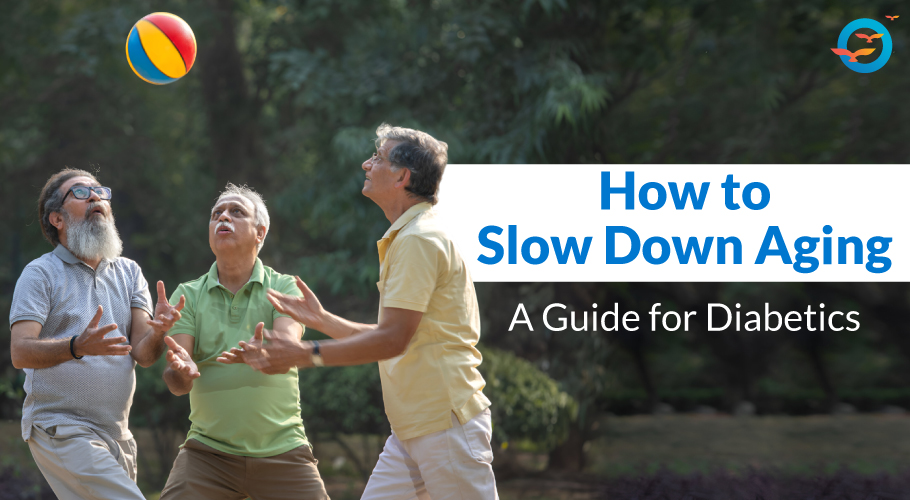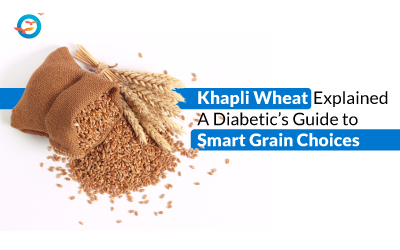Understanding Aging: Reverse the clock!

How to Slow down Aging Naturally?
Have you noticed that some people seem to look older than their actual age? Diabetics often experience this accelerated aging, and there are clear reasons behind it. Interestingly, aging itself is considered a disease that can be slowed or even stopped.
Why Do Diabetics Age Faster? 5 Key Reasons Explained
1. Chronological Age:
This refers to your age based on the number of years you’ve lived.
2. Biological Age:
This reflects how well your organs and tissues are functioning right now. It’s your biological age, not your chronological age, that truly determines your health and risk for diseases. Fortunately, you can naturally slow down your biological age.
For Diabetics, Aging Speeds Up For 5 Key Reasons
1. High BSL
Elevated blood sugar levels accelerate aging by producing advanced glycatied end products (AGEs), which result from the nonenzymatic glycation of proteins and lipids. This process leads to skin wrinkling due to glycation. Additionally, AGEs, along with sugar alcohols like sorbitol, accumulate and contribute to issues such as cataracts and nerve damage in blood vessels.
Furthermore, high blood sugar causes significant damage to the small, sensitive endothelial cells lining the inside of blood vessels. This damage accelerates aging throughout the body and increases the risk of heart attacks and strokes.
2. High insulin levels:
High insulin levels in type 2 diabetics can have devastating consequences, as they cause cells to absorb not only sugar but also excess water and fat, triggering oxidative stress and the formation of free radicals that can damage your heart and compromise brain function.
3. Oxidative stress:
The hidden consequence of high sugars and insulin. As glucose and fat flood your system, their acidic properties disrupt the balance between oxidants and antioxidants. Your body's attempts to neutralize the acid deplete its antioxidant stores, paving the way for oxidative stress and chronic inflammation. The result? Accelerated aging and a worn, weathered appearance.
4. Metaflammation:
The cumulative effect of the above changes over time leads to a state of chronic, low-grade inflammation known as metaflammation. In essence, this means a persistent, low-level inflammation that affects multiple organs throughout the body, ultimately accelerating the aging process.
5. Cellular Senescence:
The previous four factors contribute to the fifth major phenomenon known as cellular senescence. In this process, cells lose their ability to divide and function properly, leading to accelerated aging. In type 2 diabetes, markers like CDKN2A (p16) are elevated, indicating premature cellular aging caused by metabolic stress.
This accelerated aging, combined with diabetes, can lead to retinal damage in up to 85% of individuals, kidney damage in 20-50%, and nerve damage in 60-70% of cases. Additionally, 75% of diabetics may die from heart-related complications, while diabetes and associated aging also increase the risk of cancer and Alzheimer’s disease.
Reverse Aging with These Simple Lifestyle Changes
1. Adopt a Plant-Based Diet:
Switching to a plant-based diet helps make the body more alkaline, reducing acidity and inflammation. Dr. David Sinclair and his team have extensively researched aging and the anti-aging effects of plants. Their studies revealed that plants grown in stressed environments produce beneficial chemicals and polyphenols through a process called xenohormesis, which can help slow down or even reverse the aging process.
2. Practice Intermittent Fasting:
Alternating between eating and fasting periods activates various mechanisms in the body, including stress pathways that promote healing and repair, which can help reverse aging. Research shows that intermittent fasting can improve lifespan and health markers. During fasting, a process called autophagy cleanses damaged cells, repairs them, and directs the body to use energy more efficiently, all of which contribute to reversing the aging process.
3. Chronic Stress:
Various forms of stress, whether from relationships, work, or finances, can accelerate the aging process. Effectively managing stress can help mitigate or even slow down aging. Techniques like meditation, counseling, and therapy can be highly beneficial.
4. Mindset:
As the body ages, the mind often begins to internalize the idea of getting older, which can further accelerate aging. This belief alone can be a significant factor in rapid aging. It’s important to think and feel young. Engage in activities that make you feel youthful, and approach the changes in your body and mind with a positive attitude. Taking on youthful activities can help you feel younger.
Chanting the Beej mantra for the heart chakra has also been known to benefit many people. The most effective way to reverse aging is through a holistic approach that combines a plant-based diet, intermittent fasting, stress management, and a shift in mindset through the right exercises and activities.
Join us in our annual HTP program, where our integrated approach has helped thousands in their 50s feel like they’re in their 30s again.
Do you want to know more about Foods To Increase Hemoglobin, visit our blog.
FAQs
Can I reverse aging naturally?
Yes, aging can be slowed or even reversed naturally through a plant-based diet, intermittent fasting, stress management, and maintaining a positive mindset.
What is the difference between biological age and chronological age?
Chronological age is the number of years you’ve lived, while biological age reflects how well your body functions. A healthier lifestyle can slow your biological age, making you feel and look younger.
What are the key reasons diabetics experience faster aging?
1. High blood sugar (glycation and tissue damage)
2. High insulin levels (oxidative stress)
3. Oxidative stress (cell damage)
4. Chronic inflammation (metaflammation)
5. Cellular senescence (aging cells losing function)
What is the best diet to slow down aging?
A plant-based, whole-food diet rich in antioxidants, fiber, and healthy fats can slow down aging and improve overall health.
Why do I age faster if I have diabetes?
If I have diabetes, I may age faster due to high blood sugar levels, increased oxidative stress, chronic inflammation, and cellular damage. These factors speed up skin aging, organ deterioration, and increase my risk of age-related diseases.

